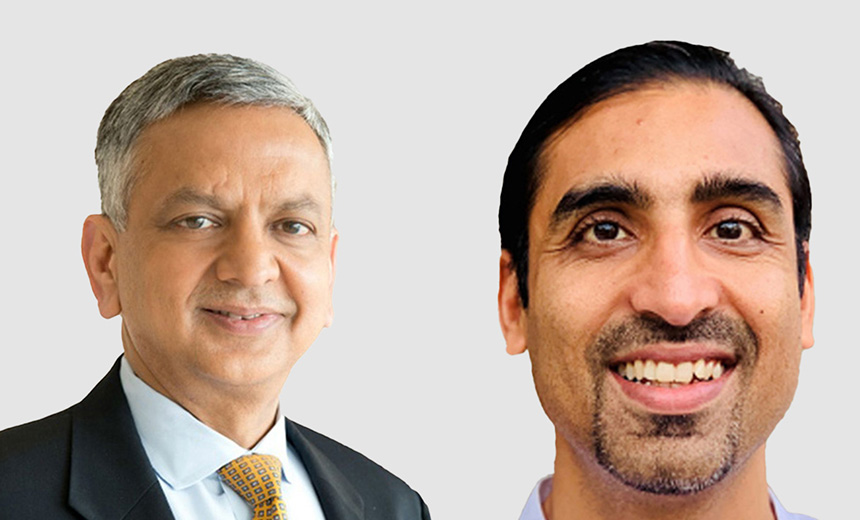Artificial Intelligence & Machine Learning
,
Finance & Banking
,
Fraud Management & Cybercrime
Rohit Chauhan and Nitendra Rajput of Mastercard on Using AI Beyond Convention

Mastercard, a global leader in payments, is not just embracing AI for traditional applications but is pushing boundaries to revolutionize customer service and prevent fraud. Handling a volume of over 20 million customer inquiries annually, the company is deploying generative AI to manage inquiries more efficiently as well as handle a significant 20% year-over-year increase in volume.
See Also: Live Webinar | Securing the Cloud: Mitigating Vulnerabilities for Government
Additionally, Mastercard utilizes AI technology to help employees navigate extensive manuals to assist customers effectively. Rohit Chauhan, executive vice president of AI at Mastercard, explained how the company’s AI-powered system processes and understands these manuals, resulting in faster and precise responses for customers.
The key differentiator in the AI landscape lies in extracting value from AI technology and delivering tangible benefits to customers,” he said.
AI for Fraud Protection
Mastercard is leveraging AI solutions to protect cardholders from potential financial threats. Unique fraud prevention algorithms process billions of transactions in a remarkable 30 milliseconds. These algorithms analyze spending behaviors, swiftly detecting and thwarting suspicious activities in real time.
To ensure responsible and inclusive use of AI, Mastercard built its fraud models based on extensive data. This approach guarantees protection for all cardholders, irrespective of their background or location.
“Back in 2018, we strategically integrated AI throughout Mastercard. We are now harnessing the power of generative AI to fortify the company and our customers. Presently, we are actively engaged in developing hundreds of AI use cases,” Chauhan said.
“Our AI-powered innovations aim to solve next-generation problems, including and beyond payments, to empower people with new digital tools and support our business customers’ AI journeys,” Chauhan said. “We use it to secure billions of transactions that pass through our network each year; our AI-powered solutions alone have saved over $35 billion in fraud globally in the past three years.”
Mastercard, a cyber assessment solution provider covering over 14 million entities, is incorporating AI into various modules within its fraud assessment ecosystem as well as in the field of behavioral biometrics to preempt and prevent fraud and make the payment process a simple and secure experience.
The integration of advanced algorithms incorporating generative AI has introduced new dimensions to its fraud prevention program. “Leveraging generative AI to create synthetic transactions has aided in proactively detecting fraud by evaluating network behavior and identifying potential vulnerabilities,” said Nitendra Rajput, SVP and head of AI Garage at Mastercard.
Despite its role in safeguarding against fraud, AI also introduces certain risks, especially emerging threats such as voice-mimicking deepfake fraud. To counter these risks, Mastercard advises its customers to adopt proactive measures such as implementing family passwords and utilizing temporary fund holds. Additionally, Mastercard advocates for active collaboration within the industry to develop solutions that preempt emerging threats. This collaborative effort harnesses sophisticated AI models to augment existing fraud prevention measures.
Tying Into Business Objective
Offering a broader insight into Mastercard’s AI strategy, Rajput emphasized that the focus isn’t solely on adopting the latest technology. “Our primary aim isn’t confined to generative AI or AI itself, but rather on how this technology serves as a potent tool to amplify our existing objectives,” he said.
Regarding ethical AI concerns, the company supports the European Union’s AI bill and encourages similar initiatives worldwide. While supporting external regulations, Mastercard asserts that the fundamental responsibility rests with AI developers in creating robust and ethical models that prioritize user safety and inclusivity.
As AI continues to permeate society, shifting from a mere technological advancement to a societal phenomenon, collaborative efforts become indispensable. To succeed, the industry needs unified global collaboration and a cohesive approach rather than fragmented AI regulations, Rajput said.
